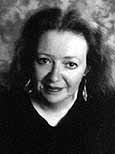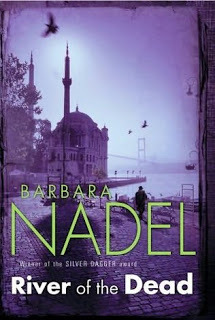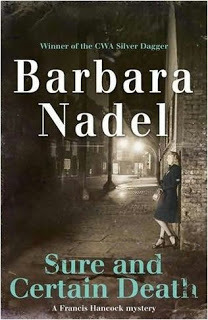Matt Rees's Blog - Posts Tagged "london"
The Writing Life interview: Barbara Nadel

One of the jobs authors are required to perform to help promote their work is the strange task of procuring from other authors something called a “blurb”—the praise you’ll find on the back cover of books. They ought to come from authors whose readers might also be interested in your book--that's the idea. In 2006, when I sent out advance copies of my first novel “The Collaborator of Bethlehem,” I had no doubt I wanted one to go to Barbara Nadel, winner of the Crime Writers Association Silver Dagger the previous year. Her fabulous series of novels about Istanbul detective Cetin Ikmen delves into a society that we think we know a great deal about – only to demonstrate how much more complex is the reality. That’s one of the things I was trying to do with my Palestinian detective Omar Yussef. I’m pleased to report that Barbara recognized that, and she was kind enough to read and comment (favorably!) on my book. She’s published 11 terrific Turkish novels and is about to publish a new novel in her other series, in which the hero is a London undertaker. The two series are rather different and make varied demands on this intelligent writer, so I thought it’d be fascinating to ask her about The Writing Life.
How long did it take you to get published?
I first started trying to get published in 1992. At that time the notion of a mystery book, much less a series set in Turkey, was rejected as almost laughable. I’ll be honest, I gave up and put my first book Belshazzar’s Daughter in a drawer for 7 years. The only reason I ever took it out again was because in 1999 I was, yet again, totally broke and I thought, ‘why not give this old thing one more go? Maybe someone will give me some cash?’ So I sent it to an agent who, on this occasion, liked it. The next thing I knew I was involved in a three book contract! Now ten years on, I write two mystery series; the Inspector İkmen stories set in modern Turkey and the Francis Hancock mysteries set in 1940s London.
Would you recommend any books on writing?
I have to admit that I’ve never read any!
What’s a typical writing day?
I live in the north of England and so my first task of the day is to look out of the window and see what the sky is doing. That done, I try to get to my desk by about 8am and then work through until lunchtime. I don’t generally do lunch – a legacy of past chain-smoking – but just have a cup of tea and maybe, just occasionally, a cigarette. I’ll then work through until about 5 or 6pm. I don’t do this every day but try to work this schedule Monday to Friday if I can. I have pretty heavy family commitments and so it’s not always possible.
Plug your latest book. Why is it so great?
I have two books out next month, one paperback, an İkmen mystery called River of the Dead, and a new Hancock hardback called Sure and Certain Death.

River of the Dead sees İkmen and his protégé Suleyman, in pursuit of an escaped prisoner. Yusuf Kaya is a murderer and drug dealer and when he escapes from prison in İstanbul it is suspected he has had help. Also because Kaya’s home town is in eastern Turkey it is strongly suspected he has gone back there. And so while İkmen pursues the investigation in İstanbul, Suleyman flies out to the eastern city of Mardin. There he finds not only drug dealing, gun running and the threat of terrorist attack, but also an exotic mix of people including Kurds, Suriani Christians and those who believe in an ancient snake goddess, the Sharmeran. This book came about as a result of a trip I made out to Mardin in 2007 and is I hope imbued with the same sense of magic and unreality that I found there. That said River of the Dead is also a tough book which address very real issues I talked to people about in Mardin, like the Iraq war. I think it’s great because although it is a crime story it is also a social commentary as well as, hopefully, introducing some people to the glories of south eastern Turkey.

Sure and Certain Death is about a series of killings that take place in the London Borough of West Ham in 1941. Middle aged women are being attacked and eviscerated. Local people start whispering about Jack the Ripper being on the prowl again. One such victim is discovered in a bombed out house by undertaker Francis Hancock. A veteran of World War I, Francis suffers from shell-shock which means that sometimes he doesn’t always know that what he is experiencing is actually real. But soon the murders come close to home and he finds himself fearing for his own sister. Sure and Certain Death is a story about World War 2 that has its murderous roots in the darkest corners of Word War 1. I think it’s a good book because it is not either an obvious murder story or a straightforward story of the London Blitz. My father experienced the Blitz when he was a child and although the Hancock books do tell of the heroism of that time, they also aim to tell it like it was too. Francis Hancock’s world is therefore one of privation, dirt, anxiety and sometimes madness.
How much of what you do is dictated by genre formula, personal formula or complete originality?
My aim is always not to write to formula but to produce something fresh every time. However within the crime/mystery genre there are certain constraints, like having a ‘tidy’ ending. Not to do this is unsatisfying for the reader, even though I do sometimes want to reflect the sheer messiness of real life. In addition series characters do have back stories which have to be addressed in some form in every book and so formula could be said to apply there too. In the main however I don’t write to formula.
What’s your favourite sentence in all literature and why?
From Great Expectations by Charles Dickens. These are the first words Miss Havisham ever speaks to Pip. They sum up both the bitterness and the tragedy of her situation perfectly.
‘This,’ said she, pointing to the long table with her stick, ‘is where I shall be laid when I am dead. They shall come and look at me here.’
She knows that her relatives will only ‘come and look’ at her. They won’t grieve. They are only interested in her money. All this is conveyed so well in this cold little sentence.
How much research is involved in each of your books?
Quite a lot, although of course it does depend on the book. For River of the Dead I had to go to Mardin and its environs and talk to people so that was pretty full-on. With the Hancock series of course I have to do historical research into aspects of World War 2 every time. Enjoyable but time consuming.
Do you live entirely off your writing? How many books did you write before you could make a living at it?
For the first 6 years of my writing career I couldn’t make my living just from my books. I had a day job in a psychiatric hospital and wrote at night and at weekends. Since the Hancock series began however (4 years ago) I have (just) been able to survive on writing. However it’s not easy and I do have to supplement my income by writing short stories and bits of journalism.
How many books did you write before you were published?
I had one academic book published before ‘Belshazzar’s Daughter’ but no fiction. Not that I didn’t try. I wrote two books which I haven’t had published. Goodness knows if they’ll ever see the light of day!
What’s the strangest thing that ever happened to you on a book tour?
Meeting an old man who was called Mr İkmen and then, not twenty four hours later, seeing a Turkish policeman who looked just like my internal vision of İkmen’s protégé, Suleyman!
What’s your weirdest idea for a book you’ll never get to publish?
A horror story about a Victorian side-show man who kills people and then places them in sentimental tableau which he charges the public one penny to view. Ghastly and weird and clearly the product of a brain that is not what it should be. Mind you, Goths would like it I am sure!
Omar Yussef "the best crime fiction can achieve"
The first rock concert I ever attended was a performance by Canada's greatest rockers Rush. I've loved Canadians ever since. In the London (Ontario) Free Press recently, Joan Barfoot gave me another reason to adore them. She gives a terrific review to the second of my Palestinian crime novels A GRAVE IN GAZA (UK title The Saladin Murders). Of my sleuth, she writes: "Omar Yussef is a brilliant creation--an outraged, modest, wry and dogged involuntary detective who is a clear, friendly and bitterly amusing comrade through the maze of horrors that a trapped populace endures. A Grave in Gaza, as well as Rees's previous Omar Yussef novel The Collaborator of Bethlehem, demonstrates the best qualities crime fiction can achieve -- gripping plots featuring a sympathetic protagonist about vital subjects."
Oldest Bible? Tell it to the Samaritans
UK newspaper The Daily Telegraph reports the discovery of a portion of a Bible from 350 AD in the library of the monastery of St. Catherine in the Sinai. The Codex Sinaiticus is written in Greek on animal skin and the newspaper calls it "a fragment of the world's oldest bible." Well, I hate to disappoint the good Fathers in the Sinai, not to mention the hacks at the Torygraph, but there's a much, much older Bible on a hilltop just outside the Palestinian town of Nablus. The Abisha Scroll is used in the rites of the ancient sect of Samaritans. I featured it in my Palestinian crime novel THE SAMARITAN'S SECRET. How old is it? Read these few paragraphs from my novel to find out just astonishingly aged it is:
“Our greatest treasure was stolen, Abu Ramiz,” Ben-Tabia said. He lifted the tips of his fingers to his beard, as though he might pull it out in despair at the thought of such a calamity. “I felt terrible shame that it should be during my tenure as a priest here in our synagogue that the Abisha Scroll might be lost.”
“The Abisha?” Omar Yussef’s voice was low and reverent.
“What’s that?” Sami said.
“A famous Torah scroll,” Omar Yussef said. “The oldest book in the world, they say.”
The priest raised his eyes to the ceiling. “The five books of Moses, written on sheepskin three thousand, six hundred and forty-five years ago. It was written by Abisha, son of Pinchas, son of Eleazar, son of Aaron who was the brother of Moses, in the thirteenth year after the Israelites entered the land of Canaan. Every year, we bring it out of the safe only once, for our Passover ceremony on Mount Jerizim.”
“It must be very valuable,” Sami said.
“It’s beyond all value. Without this scroll, our Messiah can never return to us. Without this scroll, we cannot carry out the annual Passover sacrifice, and if we fail to sacrifice on Passover we cease to be Samaritans and the entire tradition of our religion comes to a terrible close.” The priest’s eyes were moist.
“Our greatest treasure was stolen, Abu Ramiz,” Ben-Tabia said. He lifted the tips of his fingers to his beard, as though he might pull it out in despair at the thought of such a calamity. “I felt terrible shame that it should be during my tenure as a priest here in our synagogue that the Abisha Scroll might be lost.”
“The Abisha?” Omar Yussef’s voice was low and reverent.
“What’s that?” Sami said.
“A famous Torah scroll,” Omar Yussef said. “The oldest book in the world, they say.”
The priest raised his eyes to the ceiling. “The five books of Moses, written on sheepskin three thousand, six hundred and forty-five years ago. It was written by Abisha, son of Pinchas, son of Eleazar, son of Aaron who was the brother of Moses, in the thirteenth year after the Israelites entered the land of Canaan. Every year, we bring it out of the safe only once, for our Passover ceremony on Mount Jerizim.”
“It must be very valuable,” Sami said.
“It’s beyond all value. Without this scroll, our Messiah can never return to us. Without this scroll, we cannot carry out the annual Passover sacrifice, and if we fail to sacrifice on Passover we cease to be Samaritans and the entire tradition of our religion comes to a terrible close.” The priest’s eyes were moist.
Published on September 03, 2009 22:50
•
Tags:
bible, britain, crime, east, fiction, israel, jesus, journalism, london, middle, nablus, omar, palestine, palestinians, religion, samaritan-s, samaritans, secret, yussef
Book of A Lifetime: The King Must Die
 The Independent runs a periodical feature in which it picks authors to write about a book which changed their lives. Last week the London newspaper asked me to write the piece. Here it is:
The Independent runs a periodical feature in which it picks authors to write about a book which changed their lives. Last week the London newspaper asked me to write the piece. Here it is:In early 1999, King Hussein fell sick on his return from cancer treatment in the US. I was Middle East correspondent for The Scotsman. Many colleagues with bigger expense budgets were already in Jordan on death watch. I poked through a second-hand bookshop on a narrow lane in Jerusalem, wondering if I ought to go too.
I picked up a 1958 edition of The King Must Die by Mary Renault. The title seemed like a good joke to share with my fellow hacks. It decided me. I paid a few shekels for it and went off happily to pack for a trip across the Jordan Valley.
Renault took the myth of Theseus and the Minotaur and constructed a novel of the historical circumstances which may have lain behind it. In the novel, the young hero becomes a champion "bull-dancer" in Crete, leaping over charging animals, and escapes to become king in Athens. Renault's sensitive characterisation and historical sense of place hooked me. In her day (she died in 1978) other writers often suggested Renault was really a male homosexual, assuming that a woman couldn't write so vividly about men. I've striven for that depth of empathy in writing about a foreign culture in my novels.
Renault's approach to Greek history shaped my Palestinian crime novels. Writing at a time when frank examinations of contemporary homosexuality – Renault was lesbian – were taboo, she made her readers look again at love between people of the same sex. She placed that love in the context of history and stories we all think we know – the Minotaur, the trial of Socrates, Alexander's conquests – and then forced us to accept that the heroes of that period had a starkly different view of sexuality. In other words, she redirected us from the myth to the reality.
I've tried to do that with the Palestinians, who are stereotyped in the news as victims or as terrorists, and so I have focused instead on real people I've known, aiming to get at the depth of their emotions.
As for Hussein, he succumbed to lymphoma. That night, after deadline, reporters packed the bar of the Intercontinental, sucking on fat Habanas and downing Laphroaig, excited by a get-together with colleagues usually spread across the region. The next day, Hussein's cortege passed through sombre crowds in the wind and rain. I happened to laugh at a remark by another journalist. An old Bedouin turned tearful, red eyes on me. I was ashamed of my laughter. For him, this wasn't a news story or even history. It was the passing of someone who had been important in his life.
It's his emotion that I remember about that day, rather than the newspaper prognostications for the political future of the Middle East, and emotion is the heart of a novel, even a political novel. Throughout the funeral, The King Must Die was in my pocket.
Matt Rees's 'The Fourth Assassin' is published by Atlantic
Published on February 21, 2010 23:05
•
Tags:
alexander-the-great, brooklyn, bull-dancer, crete, crime-fiction, greece, greek-history, homosexual-literature, jerusalem, jordan, jordan-valley, king-hussein, london, mary-renault, middle-east, minotaur, new-york, omar-yussef, palestine, palestinian, socrates, the-fourth-assassin, the-independent, the-king-must-die, the-scotsman, theseus
Times thriller roundup: Omar Yussef 'most beguiling of current sleuths'
Set in a pulsating, multicultural city, Matt Rees’s The Fourth Assassin relocates his Palestinian series hero Omar Yussef to a wintry New York, where a UN conference provides a pretext for visiting his son Ala; but when he reaches Ala’s Brooklyn apartment, he discovers the headless body of one of his roommates. Yussef teams up with a local cop to investigate, and confirms his status as one of the most beguiling of current sleuths as they try to establish whether the victim was killed by a drug dealer, a romantic rival or an Islamist cell intent on a high-profile assassination.
There's also a review of Sophie Hannah's latest. I did a joint reading with her last year in a remote spot in Derbyshire. Her novel was about infidelity. She confessed that she'd probably have an affair with any man who asked her to do it in the afternoon, but complained that such offers usually come late at night when she really just wants to sleep. I thought it was the most refreshing perspective on extramarital affiars I've heard for a long time and probably a good tip for would-be philandering males.
The other reviews include new ones from Nicci French and Lee Child.
Published on April 05, 2010 00:30
•
Tags:
brooklyn, crime-fiction, derbyshire, drugs, islamists, jenny-cooper, joan-brady, john-dugdale, joseph-kanon, lee-child, london, matt-rees, new-york, nicci-french, peter-temple, reviews, sophie-hannah, sunday-times, the-fourth-assassin, thrillers, times-online
Soggy sheep at breakfast
 I was under the impression that the English weren’t allowed into Wales any more, now that Tony Blair persuaded us we ought to have at least half a government of our own and let Westminster pay for it. I assume Colin Cotterill managed to make it through the border undercover on his Australian passport. Which is a good thing, because his blog post of this week was a lovely appreciations of my homeland, even down to the 28 yards of daily rainfall for which I yearn as I swelter through 40-degree desert heat here in Jerusalem.
I was under the impression that the English weren’t allowed into Wales any more, now that Tony Blair persuaded us we ought to have at least half a government of our own and let Westminster pay for it. I assume Colin Cotterill managed to make it through the border undercover on his Australian passport. Which is a good thing, because his blog post of this week was a lovely appreciations of my homeland, even down to the 28 yards of daily rainfall for which I yearn as I swelter through 40-degree desert heat here in Jerusalem.During his stay at the Hay-on-Wye Book Festival, Colin muses that a soggy sheep would be less attractive than a dry one. A dry sheep may conjure up pleasanter images of romantic moments in the haybarn (in a land where there are more sheep than humans, romance might occasionally include a sheep.) There is, however, considerable lanolin in the sheep’s wool, so the rainfall doesn’t penetrate to the sheep’s body and therefore a good shake would be all that’s needed to dry him or her out – for further investigation, as it were.
I hope that clears things up for you, Colin. Next time you’re at the Hay festival, even if it’s raining, sheep are the perfect antidote. (Why do you think all those fat, boozed up London publishing types come all the way to the countryside?) Take this old Welsh joke as your cue:
A man walks into a pub. “Jones has been found having sex with a sheep,” he says. The barman looks up and asks, “Was it a male sheep or a female sheep?” “A female sheep, of course,” says the man. “There’s nothing wrong with Jones.”
Read the rest of this post at my blog
Published on June 23, 2010 07:53
•
Tags:
colin-cotterill, england, hay-book-festival, israel, jerusalem, london, publishing, sheep, ustralia, wales



